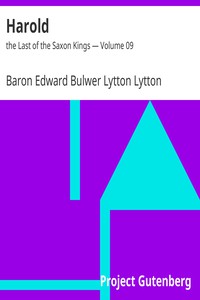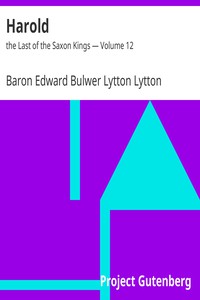Harold : the Last of the Saxon Kings — Complete, Lytton [best e reader for academics .txt] 📗

- Author: Lytton
Book online «Harold : the Last of the Saxon Kings — Complete, Lytton [best e reader for academics .txt] 📗». Author Lytton
12 (return)
“By the splendour of God.”
13 (return)
See Note (A) at the end of this volume.
14 (return)
It is noticeable that the Norman dukes did not call themselves Counts or Dukes of Normandy, but of the Normans; and the first Anglo-Norman kings, till Richard the First, styled themselves Kings of the English, not of England. In both Saxon and Norman chronicles, William usually bears the title of Count (Comes), but in this tale he will be generally called Duke, as a title more familiar to us.
15 (return)
The few expressions borrowed occasionally from the Romance tongue, to give individuality to the speaker, will generally be translated into modern French; for the same reason as Saxon is rendered into modern English, viz., that the words may be intelligible to the reader.
16 (return)
“Roman de Rou,” part i., v. 1914.
17 (return)
The reason why the Normans lost their old names is to be found in their conversion to Christianity. They were baptised; and Franks, as their godfathers, gave them new appellations. Thus, Charles the Simple insists that Rolf-ganger shall change his law (creed) and his name, and Rolf or Rou is christened Robert. A few of those who retained Scandinavian names at the time of the Conquest will be cited hereafter.
18 (return)
Thus in 991, about a century after the first settlement, the Danes of East Anglia gave the only efficient resistance to the host of the Vikings under Justin and Gurthmund; and Brithnoth, celebrated by the Saxon poet, as a Saxon par excellence, the heroic defender of his native soil, was, in all probability, of Danish descent. Mr. Laing, in his preface to his translation of the Heimskringla, truly observes, “that the rebellions against William the Conqueror, and his successors, appear to have been almost always raised, or mainly supported, in the counties of recent Danish descent, not in those peopled by the old Anglo-Saxon race.”
The portion of Mercia, consisting of the burghs of Lancaster, Lincoln, Nottingham, Stamford, and Derby, became a Danish state in A.D. 877;—East Anglia, consisting of Cambridge, Suffolk, Norfolk, and the Isle of Ely, in A.D. 879-80; and the vast territory of Northumbria, extending all north the Humber, into all that part of Scotland south of the Frith, in A.D. 876.—See PALGRAVE’S Commonwealth. But besides their more allotted settlements, the Danes were interspersed as landowners all over England.
19 (return)
Bromton Chron—via., Essex, Middlesex, Suffolk, Norfolk, Herts, Cambridgeshire, Hants, Lincoln, Notts, Derby, Northampton, Leicestershire, Bucks, Beds, and the vast territory called Northumbria.
20 (return)
PALGRAVE’s History of England, p. 315.
21 (return)
The laws collected by Edward the Confessor, and in later times so often and so fondly referred to, contained many introduced by the Danes, which had grown popular with the Saxon people. Much which we ascribe to the Norman Conqueror, pre-existed in the Anglo-Danish, and may be found both in Normandy, and parts of Scandinavia, to this day.—See HAKEWELL’s Treatise on the Antiquity of Laws in this Island, in HEARNE’s Curious Discourses.
22 (return)
PALGRAVE’s History of England, p. 322.
23 (return)
The name of this god is spelt Odin, when referred to as the object of Scandinavian worship; Woden, when applied directly to the deity of the Saxons.
24 (return)
See Note (B), at the end of the volume.
25 (return)
The Peregrine hawk built on the rocks of Llandudno, and this breed was celebrated, even to the days of Elizabeth. Burleigh thanks one of the Mostyns for a cast of hawks from Llandudno.
26 (return)
Hlaf, loaf,—Hlaford, lord, giver of bread; Hleafdian, lady, server of bread.—VERSTEGAN.
27 (return)
Bedden-ale. When any man was set up in his estate by the contributions of his friends, those friends were bid to a feast, and the ale so drunk was called the bedden-ale, from bedden, to pray, or to bid. (See BRAND’s Pop. Autiq.)





Comments (0)